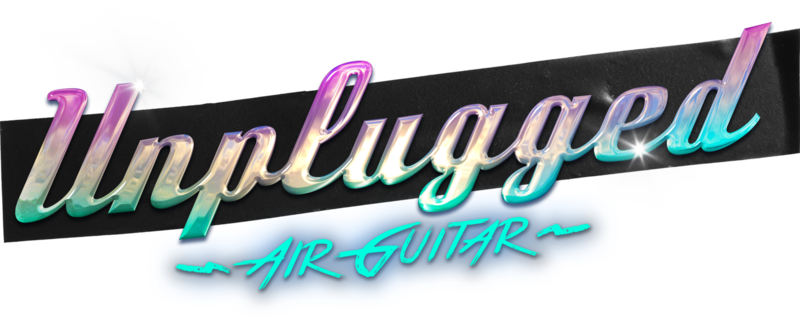Unplugged hands-on preview: Guitar Hero for the hand tracking era
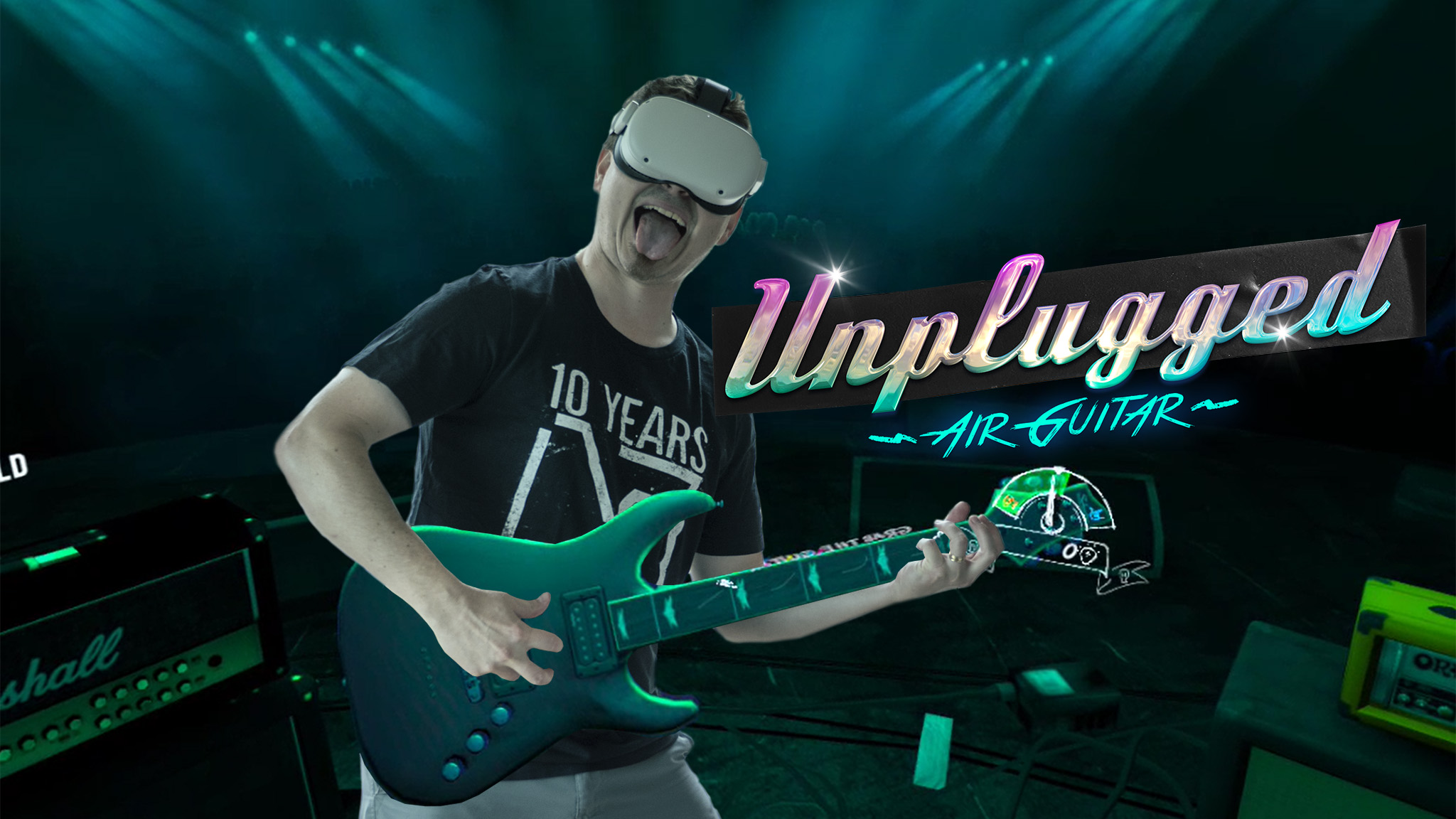
Have you ever been jamming out to a favorite song and found your fingers pretending like they're playing guitar? Even those of us who have no idea how to actually play guitar — that's me, for the record — have found myself pretending to shred the air along with a particularly fierce guitar solo more than once.
Unplugged lets you take your unfounded air guitar skill and hone it into a way to play music. It's a rhythm game with no equal, and that all comes down to the tech being used. It's truly the Guitar Hero of VR, as our Unplugged preview shows, but it doesn't require any kind of special controller. In fact, you won't be using a controller at all. This is purely a hand tracking experience on Quest, which means you'll use your hands one hundred percent of the time.
This Unplugged preview was played on an Oculus Quest 2 with access provided by publisher Vertigo Games.
A master class in hand tracking
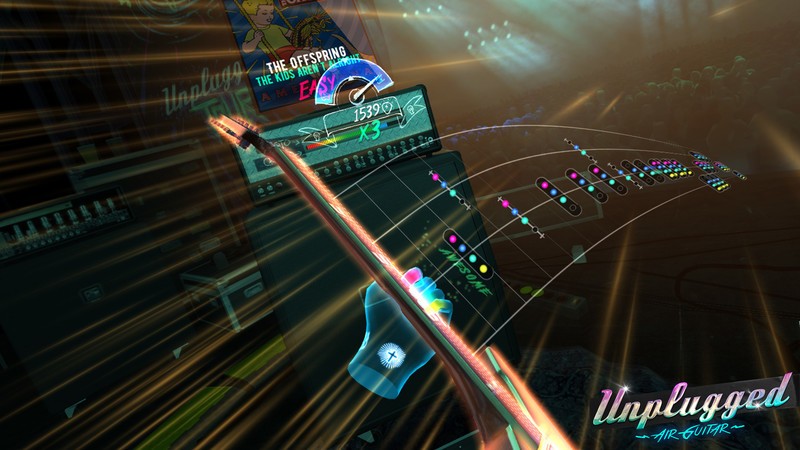
Unplugged uses Oculus hand tracking tech — tech that has, historically, been a gimmick even on the best hand tracking games — and, subsequently, is playable only on the Oculus Quest or Oculus Quest 2. Unplugged gets hand tracking right in ways no other game has been able to so far, and it likely has a lot to do with how your hands are positioned.
Unplugged gets hand tracking right in ways no other game has been able to so far.
Because of how you would naturally hold a guitar, the Oculus Quest cameras can see your fingers at all times. That's the key to making sure that the system understands what your hands are doing and where many hand tracking experiences get it wrong. After all, if you're reaching out for an object and the back of your hand occludes the cameras' view of your fingers, the system has no idea what you're actually doing.
Since the guitar can be held in either right or left-handed positions, you can use either hand to hold the fretboard. To change notes through the song, you'll slide your hand up or down the imaginary neck of the guitar and hold it in one of four marked spaces. As you look at your fingers in VR, you'll note that each one has a unique color: the index finger is red, the middle finger is blue, the ring finger is green, and the pinkie is yellow. You won't use your thumb to play notes.
As you move past easy difficulty, Unplugged has you using more combinations of your fingers to hit notes. Some notes require two fingers, while others use three. Riffs only require you to strum once at the beginning of the note and hold the fret cords until the riff ends. Other notes will play off the imaginary cord vibration and have you switch your hold on the frets without adding in an extra strum.
Be an expert in 5 minutes
Get the latest news from Android Central, your trusted companion in the world of Android
Without having played guitar myself, it certainly feels a lot closer to how I imagine an actual guitar is played versus something like Guitar Hero, where you simply press a single button for each note. You can see me play through The Kids Aren't Alright by The Offspring on normal difficulty in the short video above.
At the beginning of each song, you'll position your guitar by grabbing the whammy bar with your strumming hand and the neck with your fret hand. The guitar itself is held in place throughout the song but rotates with your fret hand as you move it around. Think of it as locking the guitar to a tripod at the beginning of the song, so it doesn't float away but still gives you the freedom to comfortably rotate the guitar as you jam with the song.
Despite not having any tactile feedback at all — not even vibration since you're not using controllers — strumming on this imaginary air guitar feels surprisingly realistic.
Despite not having any tactile feedback at all — not even vibration since you're not using controllers — strumming on this imaginary air guitar feels surprisingly realistic. Part of the magic is that the guitar rotates with your fret hand — as stated above — and the other part is that you can see your hands clearly moving up and down the fretboard, no matter where in the air your hands actually are. Matching up your hands with a rotating guitar does wonders to make you feel like you're actually holding it.
Unique mechanics, familiar formula
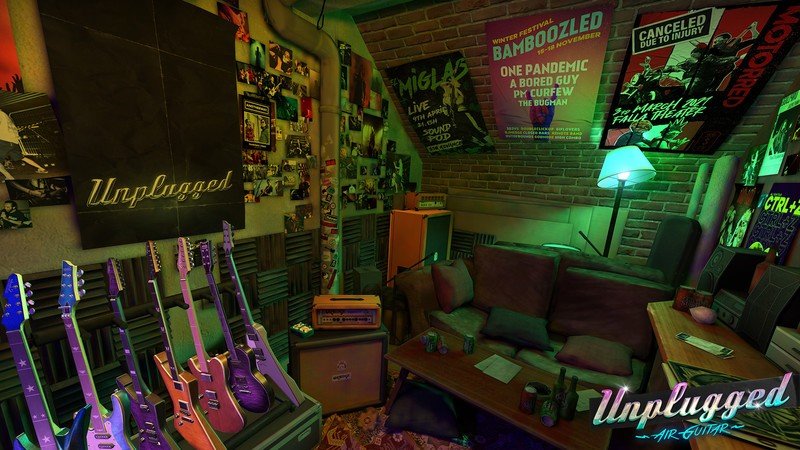
In this hands-on Unplugged preview, I got the chance to strum through the intro — starred by Satchel from Steel Panther, a pastiche 80's hair metal band from L.A. — and four songs, each with several difficulty levels to play through. Those included:
- The Kids Aren't Alright - The Offspring
- Say it Ain't So - Weezer
- Flying High Again - Ozzy Osbourne
- Fortunate Son - Creedence Clearwater Revival
Gameplay in Unplugged is what you would expect from a guitar-based rhythm game and mixes well with the unique mechanics.
From the get-go, you can scroll through the carousel of available songs with your finger — probably the only hand tracking mechanic that was tricky to get the hang of — or pick a song and play in succession for as long as you'd like by just tapping the "next song" button. This "next song" mechanic was particularly well done and not something you often find on rhythm games. It really helped keep me in the zone while playing rather than being interrupted by a menu every time a song ends.
Each playthrough nets you a score based on how well you did, and some rounds will even qualify for a special bonus round, as well. During the bonus round, you'll catch objects thrown at you from the crowd, with each trinket adding to your bonus score. After that, you'll be added to the global leaderboard and shown your standing, just as you might expect from a rhythm game.
While it wasn't shown off in this Unplugged preview, players will get the chance to earn additional guitars throughout their play, as you'll note in the screenshot above, which takes place in the backstage area where you begin the game. There also appears to be a fanbase that you'll grow over time and likely other features we weren't able to see in this preview build.
Like most rhythm games, lower difficulties tend to be less synched with the song itself. Unfortunately, that could actually make it more difficult to play with the music since it doesn't feel like some of the notes line up just right. It's necessary to go through these easier difficulties in order to develop your skills, but they always present their own problems in rhythm games.
Hard mode is where the real challenge begins, introducing cursed notes and lots of combos.
Harder difficulties will have you moving more quickly, using more varied combinations of cords, and add in several different types of cords that you'll need to master. My wife had a more difficult time getting acclimated to the game than I did, so it's possible that the disjointed feeling of not actually holding the guitar could take a bit more adjustment for some folks. On the other hand, I didn't start having trouble until hard mode, which falls in line with what I expect from my time with other rhythm games.
I wish there were better audio cues for when you hit or miss a note. There's a definite "oops" note that plays when you miss, but the music doesn't stop at all, and it feels a bit disjointed. Some rhythm games will drop the audio level a bit as you miss, letting you know you made a mistake without needing to see it. Given the amount of visual information presented on screen, I really do hope to see something like this added in the final game.
Unplug and unwind
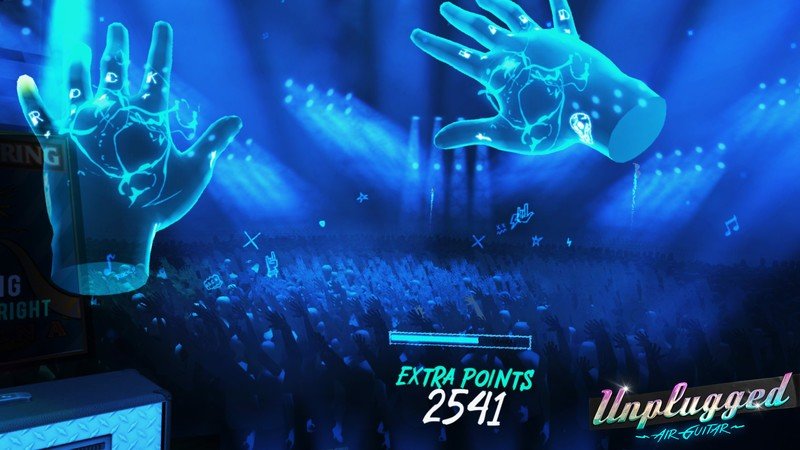
Unplugged feels like an ideal addition to the Oculus Quest library, if for no other reason than the fact that it makes the nearly effortless Quest platform even more effortless. All you need to do is put your headset on and use your hands to navigate the UI, launch the game, and jam away without ever having to touch a controller.
Despite needing no controller, this game is extremely accessible for folks with certain disabilities.
That also means you can't use a controller with this game — something that might be a turn-off for some players — but it isn't any less limiting than the requirement to use a special controller on the rhythm games of yore. It's also a lot less expensive than those games since you'll only need to buy the game itself and not a special controller, too.
Folks with disabilities or other accessibility needs can be confident that developer Anotherway put some serious thought into these needs during the game's development. Cords are color-coordinated with your fingers but are also in unique positions that make it apparent which fingers you'll need to use to press on the fretboard to hit a note. Oculus already has colorblind options built into the system anyway, so between those two things, users with color impairments should be able to play without issue.
If you don't want to stand the entire time, it's easy enough to take a seat and bring the guitar down to your lap. Since the guitar doesn't move its physical position and only rotates along the base, aligning with the hand that holds the fretboard, Unplugged can be comfortably played sitting down as well as standing up.
I'm not yet clear on how players who might be missing fingers will be able to play the game, as there were no real options in the preview version, but I've asked the developer about this accessibility need and will update this preview with more information. Right now, a Valve Index is the only way to play the game with a controller since it has full finger tracking. That version will be available on SteamVR.
If you want to play with a controller, a Valve Index will be the only way to go.
Unplugged is coming to the Quest and SteamVR platforms this year. However, since the controller-tracked version probably feels quite a bit different from playing the game with just your hands, we'll reserve judgment and comment on that version of the game for a later time.

